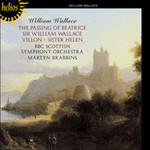|
Back
01/24/2014
William Wallace: Symphonic Poems No. 5 “Sir William Wallace”, No. 6 “Villon”, No. 1 “Le Trépas de Béatrice”, & No. 3 “Sœur Helen”
BBC Scottish Symphony Orchestra, Martyn Brabbins (Conductor)
Recorded at City Halls, Candleriggs, Glasgow (December 12-13, 1995) – 73’
Hyperion Records Helios # CDH55461 – Booklet in English, French and German

   
It’s easy to overlook a vast compendium of classical music from the British Isles lying beneath the names of more entrenched composers. Helios’ new release, therefore, befits a celebratory occasion with an introduction to the first ever commercial recording of composer William Wallace’s symphonic poems. Martyn Brabbins’ BBC Scottish Symphony Orchestra delivers a lucid interpretation: well-articulated, conservative in restraints yet possessive of intentional evocation.
Ophthalmologist turned composer, William Wallace was a bit of a musical renegade. Just as France experienced formation of Les Apaches in 1900, so, too, was a gang of six rebels beginning to form across the English Channel that challenged the conservative status quo. William Wallace was one of them, evidenced in the music created on this album. Well quartered in expected complacency his music is not! His music, however, teems with emotional depth and contrast, depicting controversial characters plucked from history and poetry with an Anglican vibrancy.
Not to be confused with the composer’s name, the opening four movement poem, Sir William Wallace commemorates one of Scotland’s great heroes (Uilliam Uallas) [Medieval Gaelic] (?-1305). The inaugurating “Lento” reveals a bit of Vaughan Williams moodiness externalized with the cello. This litany of sadness soon pops forth with Korngold-type cinematic qualities in the “Miserato” with an agitated itchiness and yearn to burst forth. This ‘rally ‘round the flag’ fervor blends into a more pensive, evenly paced “Andante con moto” that shortly courses into the “Vivace.” A fanfare of brass symbolically achieves the feeling of Scotland’s trump, ending the Poem with military flair with a stately snap of a snare drum.
Villon (1909) is a fascinating character piece, chronicling the checkered past of controversial Frenchman François Villon (1431-1463). Set against the backdrop of the namesake’s Grand Testament, the seventeen-plus minute composition opens with a bit of naughtiness that immediately brings to mind Richard Strauss’ own tone poem Till Eulenspiegel’s Merry Pranks (1894-1895). But Wallace’s collection moves along altogether on a different path, encountering a bit ironic twists and turns. Within, we hear a capricious dialogue featuring Falstaff bombastic blasts from the brass (“Più lento”), illicit depictions highlighting well-known courtesans in a reflective, pining souvenir (“Ballade des Dames du Temps jadis”), Catholic piousness cleansing the corrupted mind, ending on a beautiful major (“Allegro”) and the chilling moment of Villon’s death set against the Sorbonne angelus. The entire piece is quite the fascinating retrospect.
The first of his symphonic poems, The Passing of Beatrice (1892), epitomizes Wallace’s introduction into composition, a time when the tendrils of innocence and beauty pervade without the traumas encountered (and represented) in his later works. Therein lies a musical poem that Wallace created as a digest into Dante’s literary vision of a woman representing purity and tranquility. The harp takes center stage in the opening bars, yet it gathers immensity and ecstatic intensity (11 minutes into the composition) that evokes such bountiful fervency found within Delius’ The Walk to the Paradise Garden (1906). Beatrice brings with it emotional joy.
In stark contrast, Helios chooses to position William Wallace’s Sister Helen as the terminal cornerstone to the album. And while the middle selection, “Andante” finds tameness within, the “Con fuoco” scatters the listener into a mesmerizing whirlpool similar to Dukas’ The Sorcerer’s Apprentice. It all comes to a grounding crash in the final bars found within the “Meno allegro.” Interpolated from the Dante Gabriel Rossetti poem, the ballad will not pacify nor mollify the listener into a quiescent lull. The ending is abrupt and shattering.
Hyperion brings a cognitive approach to this William Wallace selection. Daring to search beyond the expected, this is a remarkable CD and well worth exploring for sophisticated and open-minded classical music souls.
Christie Grimstad
|